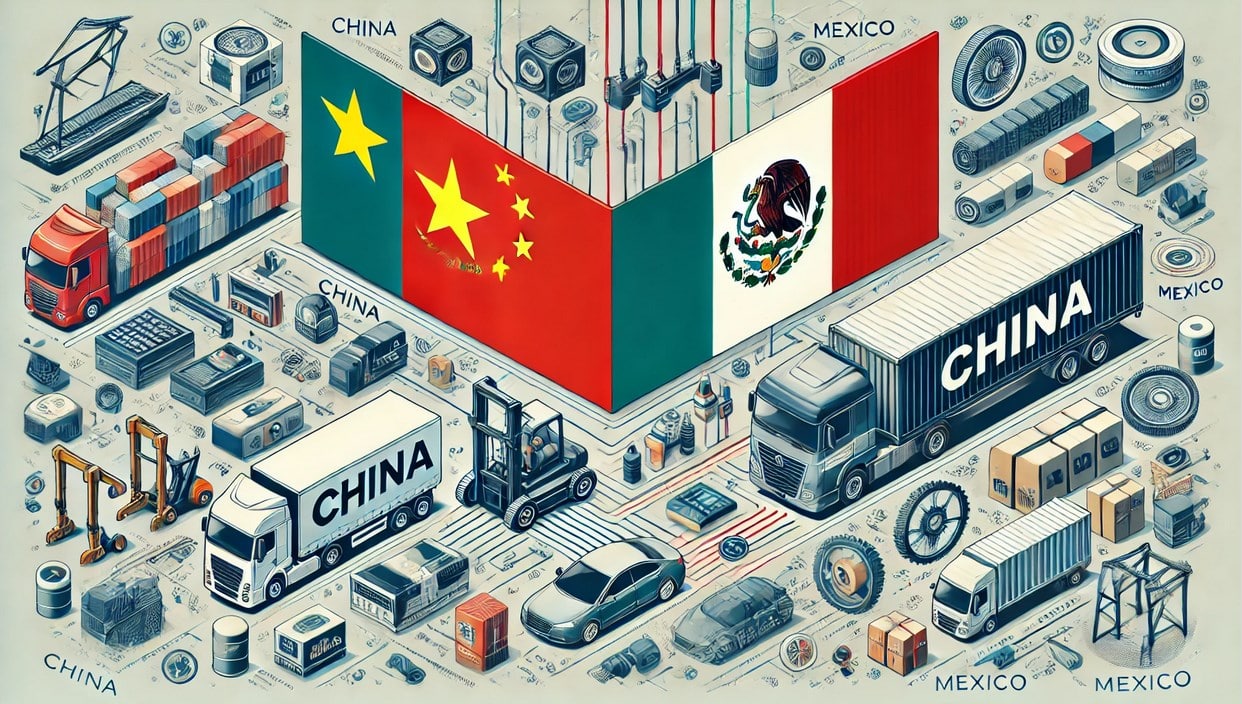What Does USMCA Stand For?
USMCA stands for “United States-Mexico-Canada Agreement.” This agreement is a trade deal between the United States, Mexico, and Canada, which replaced the North American Free Trade Agreement (NAFTA) on July 1, 2020. The USMCA aims to create a more balanced, reciprocal trade environment, fostering economic growth and maintaining robust trade relations among the three countries.

Comprehensive Explanation of the United States-Mexico-Canada Agreement (USMCA)
Overview of USMCA
The United States-Mexico-Canada Agreement (USMCA) is a comprehensive trade agreement designed to strengthen economic ties between the United States, Mexico, and Canada. The USMCA modernizes the previous NAFTA framework, incorporating new provisions to address 21st-century trade issues, such as digital trade, intellectual property, and labor rights.
Key Provisions of USMCA
Market Access
USMCA enhances market access for goods and services across the three countries. Key aspects include:
- Agricultural Trade: The agreement improves access for U.S. farmers and ranchers by eliminating certain tariffs and expanding quotas for products like dairy, poultry, and eggs.
- Automotive Industry: USMCA requires that 75% of automotive content be made in North America, up from 62.5% under NAFTA, to qualify for tariff-free access.
- Textiles and Apparel: The agreement promotes the use of North American-made fibers, yarns, and fabrics, enhancing regional supply chains.
Digital Trade
USMCA includes robust provisions to facilitate digital trade and protect e-commerce. These provisions ensure:
- Free Flow of Data: The agreement prohibits data localization requirements, allowing data to flow freely across borders.
- Cybersecurity: USMCA establishes cooperation on cybersecurity to protect digital infrastructure and trade.
- Consumer Protection: The agreement includes measures to protect consumers from fraudulent and deceptive practices online.
Labor Rights
USMCA strengthens labor rights and protections to ensure fair working conditions. Key elements include:
- Labor Standards: The agreement requires all parties to adhere to International Labor Organization (ILO) standards, including the right to collective bargaining and freedom from forced labor.
- Enforcement Mechanism: USMCA introduces a rapid-response labor mechanism to address violations of labor rights in specific facilities.
- Wage Provisions: The agreement includes provisions to ensure that a significant portion of automotive production is carried out by workers earning at least $16 per hour.
Environmental Protections
USMCA incorporates comprehensive environmental protections to promote sustainable trade practices. These include:
- Conservation Efforts: The agreement includes commitments to combat illegal wildlife trafficking and promote sustainable fisheries management.
- Pollution Control: USMCA requires parties to enforce environmental laws and cooperate on reducing marine litter and air pollution.
- Environmental Governance: The agreement strengthens environmental governance by promoting transparency, public participation, and enforcement of environmental regulations.
Implementation and Impact
Economic Impact
USMCA aims to create a more balanced trade environment, benefiting businesses, workers, and consumers across North America. By improving market access and enhancing regulatory cooperation, the agreement is expected to boost economic growth and job creation.
Supply Chain Integration
The agreement promotes deeper integration of supply chains across North America. By encouraging the use of regional inputs and enhancing trade facilitation measures, USMCA helps businesses optimize their operations and reduce costs.
Investment and Innovation
USMCA supports investment and innovation by providing a stable and predictable trade environment. The agreement includes protections for intellectual property rights, promoting innovation and competitiveness in key industries such as pharmaceuticals, technology, and manufacturing.
Challenges and Criticisms
Trade Disputes
While USMCA aims to resolve trade disputes more effectively, disagreements among the member countries can still arise. The agreement includes mechanisms for dispute resolution, but the potential for trade conflicts remains.
Compliance and Enforcement
Ensuring compliance with USMCA provisions requires robust enforcement mechanisms. The agreement introduces new enforcement tools, but their effectiveness depends on the commitment and cooperation of the member countries.
Economic Disparities
Critics argue that the benefits of USMCA may not be evenly distributed, with some sectors and regions potentially experiencing negative impacts. Addressing these disparities requires targeted policies and support measures.
Notes to Importers
Understanding USMCA
For importers, understanding the provisions and implications of USMCA is crucial for navigating the North American trade landscape. The agreement offers opportunities for improved market access, but it also introduces new compliance requirements.
Key Considerations for Importers
Rules of Origin
USMCA’s rules of origin determine whether goods qualify for preferential tariff treatment. Importers must ensure that their products meet these rules, which often involve specific criteria for the production and sourcing of materials.
Tariff Preferences
The agreement provides tariff preferences for a wide range of goods, but importers need to be aware of any exclusions or limitations. Understanding the tariff schedules and product-specific rules is essential for maximizing benefits.
Compliance with Labor and Environmental Standards
USMCA includes robust labor and environmental standards. Importers must ensure that their supply chains comply with these standards to avoid potential penalties and disruptions.
Practical Tips for Importers
Leverage Trade Facilitation Measures
USMCA includes provisions to streamline customs procedures and reduce trade barriers. Importers should take advantage of these measures to expedite shipments and reduce costs.
Monitor Regulatory Changes
The regulatory environment under USMCA can evolve, with periodic updates and changes to compliance requirements. Staying informed about these changes is crucial for maintaining compliance and optimizing trade operations.
Build Strong Relationships with Suppliers
Strong relationships with suppliers in North America can help importers navigate the complexities of USMCA and ensure a reliable supply chain. Regular communication and collaboration are key to leveraging the benefits of the agreement.
Sample Sentences and Their Meanings
- “The USMCA agreement has significantly improved market access for our agricultural products in Canada and Mexico.”
- This sentence highlights how USMCA has enhanced opportunities for exporting agricultural goods to Canada and Mexico.
- “We need to ensure our products comply with USMCA’s rules of origin to benefit from tariff preferences.”
- This sentence emphasizes the importance of meeting the rules of origin criteria to qualify for reduced tariffs under USMCA.
- “The digital trade provisions in USMCA facilitate the free flow of data across borders, benefiting our e-commerce operations.”
- This sentence explains how the agreement’s digital trade rules support cross-border e-commerce by allowing data to move freely.
- “USMCA’s labor standards require us to adhere to higher labor practices in our supply chain.”
- This sentence indicates that the agreement mandates compliance with improved labor standards within the supply chain.
- “By leveraging USMCA’s trade facilitation measures, we can expedite our customs procedures and reduce shipping times.”
- This sentence points out the advantage of using the agreement’s measures to speed up customs processes and enhance logistics efficiency.
Other Meanings of USMCA
| Acronym | Full Form | Description |
|---|---|---|
| USMCA | United States-Mexico-Canada Agreement | A trade agreement between the United States, Mexico, and Canada. |
| USMCA | University of Southern Maine Cooperative Alliance | A collaborative initiative involving the University of Southern Maine. |
| USMCA | United States Marine Corps Association | An organization supporting members of the United States Marine Corps. |
| USMCA | United States Medical Certification Authority | An authority responsible for certifying medical professionals in the U.S. |
| USMCA | Ultra Small Modular Components Assembly | A process for assembling miniature electronic components. |
| USMCA | Underwater Survey and Mapping Coordination Agency | An agency coordinating underwater survey and mapping activities. |
| USMCA | Unified System for Monitoring Climate Activities | A system for monitoring and analyzing climate-related data. |
| USMCA | Universal Standards for Marine Conservation Areas | Standards for the management and protection of marine conservation areas. |
| USMCA | Urban Sustainability and Mobility Coordination Authority | An authority focused on urban sustainability and mobility initiatives. |
| USMCA | United States Mining and Conservation Association | An organization promoting sustainable mining practices. |
| USMCA | Ultimate Sports Management and Coaching Association | An association for sports management and coaching professionals. |
| USMCA | United States Media Content Association | An organization representing media content creators and distributors. |
| USMCA | Unmanned Systems and Machine Control Applications | Applications involving the use of unmanned systems and machine control technology. |
| USMCA | United States Music and Cultural Alliance | An alliance promoting music and cultural exchange in the U.S. |
| USMCA | Unified System for Medical Care Administration | A system for managing and coordinating medical care services. |
| USMCA | United States Manufacturing and Commerce Association | An organization supporting manufacturing and commerce in the U.S. |
| USMCA | Universal Standards for Microbial Control Applications | Standards for microbial control in various applications. |
| USMCA | Underwater Systems Maintenance and Calibration Authority | An authority responsible for maintaining and calibrating underwater systems. |
| USMCA | United States Marketing and Communications Alliance | An alliance promoting marketing and communications practices. |
| USMCA | Universal System for Measuring Cultural Achievements | A system for evaluating and measuring cultural achievements. |






